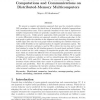Free Online Productivity Tools
i2Speak
i2Symbol
i2OCR
iTex2Img
iWeb2Print
iWeb2Shot
i2Type
iPdf2Split
iPdf2Merge
i2Bopomofo
i2Arabic
i2Style
i2Image
i2PDF
iLatex2Rtf
Sci2ools
122
click to vote
CJ
1999
1999
Evolution-Based Scheduling of Computations and Communications on Distributed Memory Multicomputers
We present a compiler optimization approach that uses the simulated evolution (SE) paradigm to enhance the finish time of heuristically scheduled computations with communication times. This is specially beneficial to the class of Synchronous dataflow computations which are generally compiled once and run many times over different data sets. Unlike genetic approaches which generally use task swapping to create differential variation our approach consists of adding pseudo-edges to the task graph to guide the scheduler in the alignment and clustering of dominant tasks. Added edges alter only the task graph without modifying the scheduler which provides useful flexibility in the implementation of compiler optimization option. The intelligence of iterative methods is used by SE to reduce the run-time and to avoid local minima by using the hill climbing property of search-based methods. Evaluation is carried out for a wide category of computation graphs with communication times which are st...
Related Content
| Added | 22 Dec 2010 |
| Updated | 22 Dec 2010 |
| Type | Journal |
| Year | 1999 |
| Where | CJ |
| Authors | Mayez A. Al-Mouhamed |
Comments (0)

